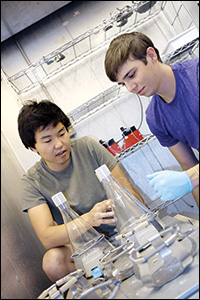News Story
"Gentle Delivery" Kits Could Help Bring Gene Therapies to Market

ChBE graduate students and Birich Technologies co-founders Kevin Diehn(right) and Chanda Arya (left) use genetically modified yeast to produce an siRNA binding protein.
Imagine if you could "turn off" the genes that instruct cells to grow into tumors or tell your immune system to attack your own body, or if you could tell immune cells to fight a disease they're ignoring. That is the promise of a potential gene therapy called RNA interference (RNAi), and a Clark School-based startup is commercializing a product that could bring it a step closer to clinical reality.
A nucleotide like DNA, but usually single-stranded, RNA is involved in the expression, coding, decoding, and regulation of genes. One type of RNA, called "silencing" (siRNA), is capable of disabling certain genetic-level activity. Controlling the silencing process could enable us to treat diseases caused by malfunctioning genes.
Currently, the use of siRNA is restricted to laboratory studies. Its therapeutic potential is overshadowed by the difficulty of delivering it to malfunctioning cells, which see it as a threat to their molecular machinery, and have lines of defenses to keep it out.
In order to circumvent those defenses, cells are subjected to chemical treatments or electrocution to produce pores in their membranes through which the siRNA can pass. This process kills many of the cells in an experiment–a reasonable loss in a Petri dish, but too dangerous for clinical use.
Department of Chemical and Biomolecular Engineering (ChBE) graduate students Chanda Arya and Kevin Diehn, advised by ChBE professor Srinivasa Raghavan, want to commercialize a non-cytotoxic, "gentle" siRNA delivery technique developed at the National Institutes of Health (NIH). Their startup company, Birich Technologies, has exclusively licensed the technology, which is based around a modified protein called a chemokine.
Cells send out chemokine as a distress call when under attack. Immune cells respond by following the trail of protein molecules to its source, internalizing it along the way–"like Pac Man eating a line of power pellets," Diehn says. The NIH's chemokine has been engineered to bind to siRNA. When an immune cell willingly consumes it using its natural mechanisms, the siRNA is taken in as well and gets to work, without damaging the cellular membrane.
Supported by a $149,251 Maryland Industrial Partnerships (MIPS) grant, Birich and Department of Cell Biology and Molecular Genetics professor Jonathan Dinman are currently developing the processes necessary to mass-produce the NIH's chemokine from genetically-modified yeast and to stabilize it for distribution and storage.
In the next phase of the project, they will distribute sample chemokine kits to scientists using siRNA to study immune system diseases. While gathering feedback, they plan to produce a "library" of chemokines, which will enable targeting of a variety of immune cells. If the chemokines' efficacy is validated by successful research, it would pave the way for Birich to launch a retail product and could ultimately become a part of FDA approved genetic therapies.
The entire project, from the marketing plan to product development, is something Arya and Diehn do outside of their Ph.D. research. They say the support they have received from Raghavan, ChBE, and the Clark School's Maryland Technology Enterprise Institute, which awarded them the MIPS grant, has made it all possible.
"We’ve been able to pursue entrepreneurship thanks to the support and freedom given to us by the UMD community," says Diehn. "Ultimately, the best way to learn something is by experiencing it firsthand."
Published August 7, 2013









